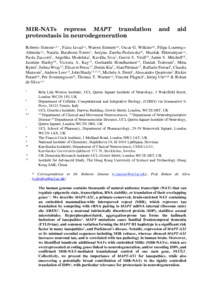Simone, R;
Javad, F;
Emmett, W;
Wilkins, OG;
Almeida, FL;
Barahona-Torres, N;
Zareba-Paslawska, J;
Ehteramyan, M;
Zuccotti, P;
Modelska, A;
et al.
Simone, R; Javad, F; Emmett, W; Wilkins, OG; Almeida, FL; Barahona-Torres, N; Zareba-Paslawska, J; Ehteramyan, M; Zuccotti, P; Modelska, A; Siva, K; Virdi, GS; Mitchell, JS; Harley, J; Kay, VA; Hondhamuni, G; Trabzuni, D; Ryten, M; Wray, S; Preza, E; Kia, DA; Pittman, A; Ferrari, R; Manzoni, C; Lees, A; Hardy, JA; Denti, MA; Quattrone, A; Patani, R; Svenningsson, P; Warner, TT; Plagnol, V; Ule, J; de Silva, R
(2021)
MIR-NATs repress MAPT translation and aid proteostasis in neurodegeneration.
Nature, 594 (7861).
pp. 117-123.
ISSN 0028-0836
https://doi.org/10.1038/s41586-021-03556-6
SGUL Authors: Pittman, Alan Michael
![[img]](https://openaccess.sgul.ac.uk/113282/1.hassmallThumbnailVersion/Simone2021_2016-04-05263D_text-Figures_final.pdf)  Preview |
|
PDF
Accepted Version
Available under License ["licenses_description_publisher" not defined].
Download (24MB)
| Preview
|
Abstract
The human genome expresses thousands of natural antisense transcripts (NAT) that can regulate epigenetic state, transcription, RNA stability or translation of their overlapping genes1,2. Here we describe MAPT-AS1, a brain-enriched NAT that is conserved in primates and contains an embedded mammalian-wide interspersed repeat (MIR), which represses tau translation by competing for ribosomal RNA pairing with the MAPT mRNA internal ribosome entry site3. MAPT encodes tau, a neuronal intrinsically disordered protein (IDP) that stabilizes axonal microtubules. Hyperphosphorylated, aggregation-prone tau forms the hallmark inclusions of tauopathies4. Mutations in MAPT cause familial frontotemporal dementia, and common variations forming the MAPT H1 haplotype are a significant risk factor in many tauopathies5 and Parkinson’s disease. Notably, expression of MAPT-AS1 or minimal essential sequences from MAPT-AS1 (including MIR) reduces—whereas silencing MAPT-AS1 expression increases—neuronal tau levels, and correlate with tau pathology in human brain. Moreover, we identified many additional NATs with embedded MIRs (MIR-NATs), which are overrepresented at coding genes linked to neurodegeneration and/or encoding IDPs, and confirmed MIR-NAT-mediated translational control of one such gene, PLCG1. These results demonstrate a key role for MAPT-AS1 in tauopathies and reveal a potentially broad contribution of MIR-NATs to the tightly controlled translation of IDPs6, with particular relevance for proteostasis in neurodegeneration.
Statistics
Item downloaded times since 26 May 2021.
Actions (login required)
 |
Edit Item |


